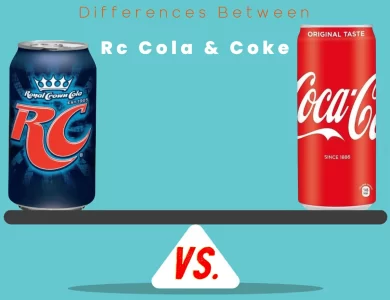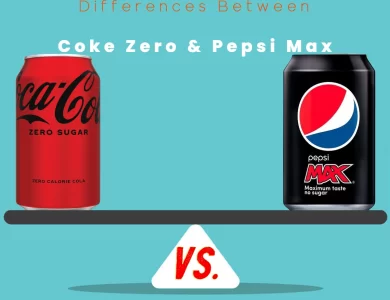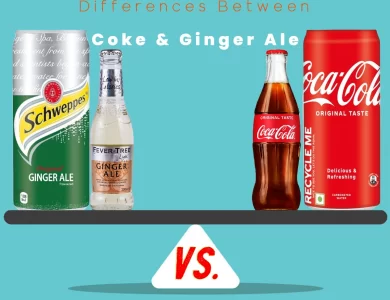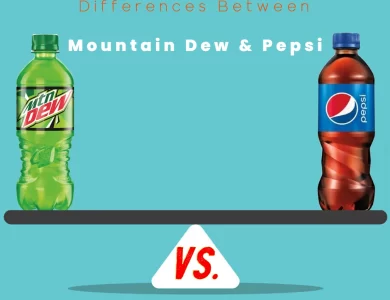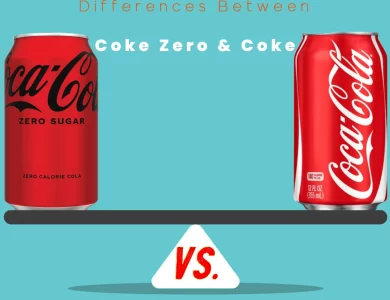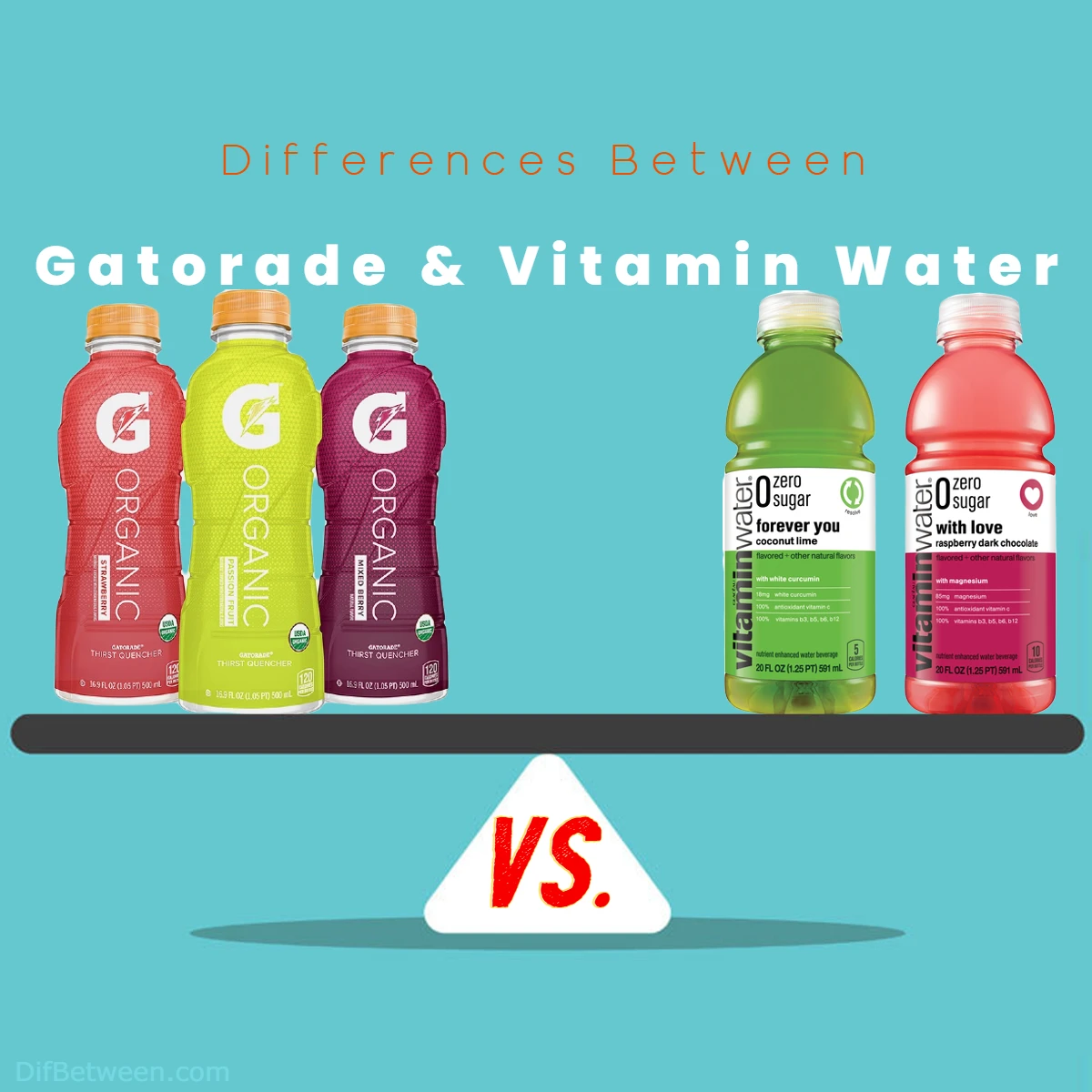
| Aspect | Gatorade | Vitamin Water |
|---|---|---|
| Origin and Backstory | Developed in 1965 as a sports fuel for athletes at the University of Florida. Commercially available since 1967. | Emerged in the early 2000s as a vitamin-enhanced water beverage. Founded by J. Darius Bikoff in 2000. |
| Primary Purpose | Replenish fluids and electrolytes lost during intense physical activities. | Provide hydration with an added boost of essential vitamins and minerals. |
| Nutritional Content | – Electrolytes: Sodium, Potassium – Carbohydrates: Sugars – Calories: 80 kcal per 12 fl oz serving – Protein: 0g | – Vitamins: Vitamin C, B complex vitamins – Minerals: Calcium, Magnesium – Calories: 50 kcal per 12 fl oz serving (low-calorie options) – Sugars: 13g per 12 fl oz serving – Protein: 0g |
| Flavor Selection | Classic sports flavors like Lemon-Lime, Fruit Punch, Orange, Berry, Cool Blue. | Exotic and unique blends such as XXX (Acai-blueberry-pomegranate), Dragonfruit, Revive, Rescue, Power-C. |
| Target Audience | Athletes, sports enthusiasts, individuals engaging in high-intensity activities. | Health-conscious individuals, moderate activity levels, individuals seeking a flavorful alternative to plain water. |
| Packaging | Squeeze sports bottles, traditional plastic bottles. | Various bottle types, with some eco-friendly options available. |
| Sweeteners and Additives | Artificial flavors, natural flavors, natural and artificial colors. | Natural flavors, erythritol, stevia for low-calorie and zero-calorie options. |
| Hydration Efficiency | Rapidly replenishes fluids and electrolytes during intense activities. | Provides hydration with an added nutrient boost. |
| Environmental Considerations | Working towards improving packaging sustainability and encouraging recycling. | Utilizing eco-friendly materials for some bottle types, promoting recycling initiatives. |
| Taste Preference | Familiar, tangy, and refreshing flavors with a focus on sports drink taste. | Diverse and innovative flavor combinations, catering to adventurous taste buds. |
| Daily Nutrient Support | Emphasis on electrolyte and carbohydrate support for sports performance. | Focus on supplementing daily vitamin and mineral intake. |
| Suitability for Casual Hydration | Suitable but be mindful of the sugar content. | A refreshing and flavorful option for everyday hydration. Low-calorie and zero-calorie options available. |
In this blog, we’re going to quench your thirst for knowledge by exploring the captivating Differences Between Gatorade and Vitamin Water. These two popular drinks have been competing for a spot in your water bottle for quite some time now, and we’re here to help you decide which one best suits your taste buds and lifestyle. Whether you’re an athlete looking for peak performance or a health-conscious individual seeking a flavorful way to meet your daily nutrient needs, we’ve got you covered. So, grab your favorite drink and let’s embark on this hydration journey together!
But wait, we’re not done just yet! To uncover all the juicy details and make an informed choice, read till the end of this blog. We’ll not only reveal the nutritional content, flavor selections, and target audiences for each beverage but also highlight their environmental impact and packaging choices. So, get ready to quench your curiosity and make the right decision when it comes to staying hydrated and nourished. Let’s dive in and find out what sets Gatorade and Vitamin Water apart!
Differences Between Gatorade and Vitamin Water
The Origins and Backstories
Gatorade: The Sports Fuel Pioneer
Gatorade, a name synonymous with sports and hydration, has a rich history that dates back to 1965. It all started at the University of Florida when a team of researchers led by Dr. Robert Cade set out on a mission to develop a drink that would keep the university’s football players hydrated during hot and intense practices. The result was Gatorade – a concoction of water, electrolytes, and carbohydrates that helped replenish the athletes’ bodies and improve performance. Eventually, Gatorade became commercially available in 1967 and took the sports world by storm, becoming the go-to hydration drink for athletes worldwide.
Vitamin Water: The Nourishing Hydration
Vitamin Water, on the other hand, is a relatively newer player in the hydration game. It emerged in the early 2000s when entrepreneur J. Darius Bikoff developed the concept of a vitamin-enhanced water beverage. In 2000, he founded Glacéau, the company behind Vitamin Water, with a vision to create a drink that not only quenches thirst but also provides essential vitamins and minerals to consumers. The brand quickly gained traction, capturing the attention of health-conscious individuals and those looking for a flavorful way to meet their daily nutrient needs.
Nutritional Content Comparison
Gatorade: Fueling Your Performance
Gatorade is primarily formulated to replenish the fluids and electrolytes lost through sweat during intense physical activities. As a result, it contains a carefully balanced blend of electrolytes, such as sodium and potassium, along with carbohydrates to provide quick energy to tired muscles. The carbohydrates in Gatorade typically come in the form of sugars, which help maintain energy levels and prevent fatigue during extended periods of exercise.
The table below highlights the typical nutritional content found in a standard 12 fl oz (355 ml) serving of Gatorade:
| Nutrient | Amount per Serving (12 fl oz) |
|---|---|
| Calories | 80 |
| Total Fat | 0g |
| Sodium | 160mg |
| Potassium | 45mg |
| Total Carbohydrates | 21g |
| Sugars | 21g |
| Protein | 0g |
Gatorade comes in various flavors, and its popularity among athletes and fitness enthusiasts lies in its ability to rehydrate and replenish nutrients effectively during and after vigorous workouts.
Vitamin Water: A Boost of Essential Nutrients
Vitamin Water, as the name suggests, is all about enriching your hydration experience with a range of vitamins and minerals. It usually contains a higher variety of nutrients compared to Gatorade, making it an attractive choice for those seeking additional health benefits beyond just hydration. The vitamins and minerals in Vitamin Water can vary depending on the flavor and formulation, but common additions include vitamin C, vitamin B complex, calcium, and magnesium.
Take a look at the general nutritional content in a typical 12 fl oz (355 ml) serving of Vitamin Water:
| Nutrient | Amount per Serving (12 fl oz) |
|---|---|
| Calories | 50 |
| Total Fat | 0g |
| Sodium | 0mg |
| Potassium | 0mg |
| Total Carbohydrates | 13g |
| Sugars | 13g |
| Protein | 0g |
| Vitamin C | 120% of the Daily Value |
| Vitamin B6 | 40% of the Daily Value |
| Vitamin B12 | 40% of the Daily Value |
| Calcium | 20% of the Daily Value |
| Magnesium | 25% of the Daily Value |
Vitamin Water’s allure lies in its ability to offer a flavorful and vitamin-packed alternative to plain water, making it a popular choice for individuals who wish to meet their nutrient needs while staying hydrated.
Flavor and Taste Selection
Gatorade: Classic Sports Flavors
When it comes to Gatorade, you’ll find a wide array of classic sports flavors that have become iconic over the years. Some of the staple Gatorade flavors include:
- Lemon-Lime: The original and timeless flavor that provides a burst of citrusy freshness.
- Fruit Punch: A sweet and tangy option reminiscent of tropical fruits.
- Orange: A zesty and refreshing choice that’s always a hit.
- Berry: A delightful mix of various berries, offering a sweet and juicy taste.
- Cool Blue: A vibrant blue hue with a refreshing berry taste, popular among Gatorade fans.
Gatorade also periodically introduces limited-edition flavors, often in collaboration with athletes or sports events, to keep things exciting for their loyal consumers.
Vitamin Water: A Palette of Exotic Blends
Vitamin Water sets itself apart from Gatorade with its diverse selection of innovative and exotic flavor combinations. Each flavor typically comes with a clever name that reflects its ingredients and benefits. Some of the intriguing Vitamin Water flavors include:
- XXX (Triple X): Acai-blueberry-pomegranate blend, brimming with antioxidants.
- Dragonfruit: A tropical mix of dragonfruit and exotic fruits, packed with vitamin C.
- Revive: Fruit-based infusion with electrolytes and vitamin B, designed to revitalize your body.
- Rescue: A mix of peach and tea extracts, providing a calming and hydrating experience.
- Power-C: Orange-orange flavor containing vitamin C to support your immune system.
The wide selection of Vitamin Water flavors makes it a fun and enjoyable option for those who crave variety and love exploring new taste sensations.
Sweeteners and Caloric Content
Gatorade: Sugar and Carb Considerations
Gatorade typically contains carbohydrates in the form of sugars, which play a crucial role in providing quick energy during physical activities. However, this also means that Gatorade has a higher caloric content compared to Vitamin Water. While the caloric content may not be a significant concern for athletes and individuals engaging in intense workouts, it’s essential to be mindful of your overall calorie intake if you’re consuming Gatorade casually or as a source of hydration throughout the day.
Vitamin Water: Low-Calorie Options
Vitamin Water, on the other hand, offers a range of low-calorie and zero-calorie options. These variations are sweetened with sugar substitutes like erythritol or stevia, which provide the sweetness without the added calories. This feature makes Vitamin Water an attractive choice for those who are conscious of their caloric intake but still want to enjoy a flavorful and nutritious beverage.
The table below provides a comparison of the calorie content in a typical 12 fl oz (355 ml) serving of Gatorade and Vitamin Water:
| Beverage | Calories per Serving (12 fl oz) |
|---|---|
| Gatorade | 80 |
| Vitamin Water | 50 (for low-calorie options) |
| 0 (for zero-calorie options) |
Electrolyte and Vitamin Differences
Gatorade: Electrolyte Emphasis
Gatorade takes pride in its formula, which is specifically designed to replenish the electrolytes lost through sweat during intense physical activity. Electrolytes, such as sodium and potassium, are essential minerals that help maintain proper fluid balance and support nerve and muscle function. The sodium in Gatorade aids in retaining fluids, while potassium assists in preventing muscle cramps and maintaining overall hydration levels.
Vitamin Water: Vitamin Variance
In contrast, Vitamin Water’s focus is on providing essential vitamins and minerals to supplement your daily nutrient intake. While it may also contain some electrolytes, the primary emphasis is on delivering nutrients like vitamin C, B complex vitamins, calcium, and magnesium. These vitamins and minerals are valuable for various bodily functions, such as supporting the immune system, aiding in metabolism, and promoting bone health.
Target Audience and Use Cases
Gatorade: Athletes and High-Intensity Activities
Gatorade’s heritage as a sports fuel has solidified its position as the go-to beverage for athletes and those engaged in high-intensity physical activities. Its carefully balanced formula of electrolytes and carbohydrates makes it an excellent choice for replenishing the body’s nutrients and hydration levels after sweating profusely during workouts, sports, or endurance exercises. For athletes looking to boost their performance and recover faster, Gatorade serves as a reliable and time-tested companion.
Vitamin Water: Health-Conscious and Everyday Hydration
Vitamin Water appeals to a broader audience, including health-conscious individuals seeking a flavorful way to supplement their daily vitamin intake. It’s a popular choice for individuals looking to stay hydrated during everyday activities, whether it’s at work, during a walk, or after a casual workout. Additionally, Vitamin Water’s low-calorie and zero-calorie options cater to those who want to watch their caloric intake without compromising on taste or nutrient content.
Packaging and Environmental Considerations
Gatorade: The Classic Sports Bottle
Gatorade is commonly found in various packaging options, including the iconic squeeze sports bottles with the distinctive Gatorade logo. These bottles are designed for convenience during sports and workouts, allowing users to rehydrate easily without having to unscrew a cap. However, the traditional plastic bottles raise environmental concerns due to their single-use nature and potential contribution to plastic waste.
Vitamin Water: Eco-Friendly Initiatives
Vitamin Water, being a relatively newer brand, has incorporated more environmentally friendly packaging practices. Some of the options may include using recyclable plastic or biodegradable materials for their bottles. Additionally, Vitamin Water has taken steps to reduce plastic waste by encouraging recycling and participating in initiatives that support environmental sustainability.
Hydration Needs and Activity Levels
Gatorade: Intense Hydration Support
Gatorade shines brightest when it comes to supporting intense hydration needs during prolonged physical exertion. For athletes participating in endurance sports, team practices, or high-intensity workouts, Gatorade’s electrolyte and carbohydrate-rich formula can be incredibly beneficial. When you sweat profusely during extended periods of activity, you lose essential electrolytes, which can lead to dehydration and decreased performance. Gatorade helps you stay ahead of this by swiftly replenishing lost electrolytes and providing a quick source of energy in the form of carbohydrates.
Moreover, Gatorade’s suitability for high-intensity activities isn’t limited to athletes alone. If you’re engaging in physically demanding tasks, such as construction work, outdoor labor, or heavy manual labor, Gatorade can also be a valuable ally in keeping you hydrated and energized throughout the day.
Vitamin Water: Everyday Hydration and Nutrient Boost
Vitamin Water, with its focus on essential vitamins and minerals, caters to those looking for everyday hydration with an added nutritional punch. While it may not be as specialized for intense physical activity as Gatorade, Vitamin Water is ideal for individuals with moderate activity levels seeking a refreshing and nourishing drink.
If you spend long hours at the office, enjoy leisurely outdoor activities, or have a busy day-to-day schedule, Vitamin Water offers a delightful way to stay hydrated while also benefiting from vitamins and minerals that support your overall health. Additionally, for individuals who may not be fond of plain water but still want to maintain their hydration levels, Vitamin Water presents an enticing alternative that satisfies both thirst and nutritional needs.
Ingredients and Artificial Additives
Gatorade: A Simple Formula
Gatorade’s formula is relatively straightforward, containing water, sugars, electrolytes (such as sodium and potassium), citric acid for flavor, and natural and artificial flavors. The sugars in Gatorade provide a quick source of energy during physical activity, but it’s essential to be mindful of the sugar content, especially if you’re using Gatorade for casual hydration.
Over the years, Gatorade has taken steps to reduce the use of artificial additives, such as artificial dyes, in response to consumer demands for more natural ingredients. As a result, you’ll find some Gatorade products with more natural coloring derived from fruit and vegetable extracts.
Vitamin Water: A Mix of Nutrients and Sweeteners
Vitamin Water’s ingredient list features water, natural flavors, vitamins (like vitamin C and B complex vitamins), minerals (such as calcium and magnesium), and sweeteners. Some Vitamin Water varieties use erythritol and stevia as sugar substitutes to offer low-calorie or zero-calorie options.
One aspect to consider is that while Vitamin Water contains vitamins and minerals beneficial for health, it may also contain added sugars or sugar substitutes for sweetness. For individuals concerned about their sugar intake, it’s advisable to choose Vitamin Water’s low-calorie or zero-calorie options.
Hydration Efficiency and Taste Preferences
Gatorade: Fast Hydration and Familiar Flavors
Gatorade’s formulation is tailored to quickly replenish fluids and electrolytes, making it an efficient choice for rapid hydration during or after intense physical activities. Its taste is generally well-liked by athletes and sports enthusiasts, who appreciate the familiar flavors that have become synonymous with the brand. The sweetness and tanginess of Gatorade flavors appeal to those seeking a straightforward and refreshing taste without venturing too far into new flavor territories.
Vitamin Water: Flavorful Experiences
Vitamin Water offers a plethora of exciting and unique flavor combinations, catering to adventurous taste buds. With creative blends like Acai-blueberry-pomegranate and dragonfruit, Vitamin Water offers a taste experience that goes beyond traditional sports drinks. This variety can be particularly appealing to individuals who enjoy exploring different flavor profiles and crave something more than just the classic sports drink taste.
While taste preferences are subjective, Vitamin Water’s diverse range of flavors makes it a fun option for those seeking an unconventional and flavorful hydration experience.
Targeted Nutrition and Daily Requirements
Gatorade: Sports Performance Support
Gatorade’s focus on electrolytes and carbohydrates is tailored to support sports performance and endurance. During intense physical activity, the body loses significant amounts of sodium, potassium, and other electrolytes through sweat. Gatorade’s electrolyte blend helps maintain the body’s electrolyte balance, reducing the risk of dehydration and cramping during prolonged exercise.
Additionally, the carbohydrates in Gatorade serve as a quick energy source for muscles, delaying the onset of fatigue and helping athletes perform at their best during extended workouts or competitions.
Vitamin Water: Daily Vitamin Boost
Vitamin Water, as the name implies, emphasizes providing essential vitamins and minerals to support overall health and well-being. These nutrients are beneficial for individuals with various lifestyle goals, including supporting their immune system, improving energy levels, and aiding metabolism.
While Vitamin Water can contribute to your daily vitamin intake, it’s essential to remember that it should not replace a well-balanced diet. It serves as a complementary source of nutrients to support your overall health, rather than a complete substitute for a nutritious meal plan.
Environmental Impact and Sustainability
Gatorade: Focus on Packaging Improvement
Gatorade, being a long-established brand, has been facing growing concerns about single-use plastic bottles’ environmental impact. However, the company has been taking steps to address these concerns and improve their packaging sustainability. Gatorade has launched initiatives to reduce plastic waste and encourage recycling. As a consumer, opting for reusable water bottles or recycling the packaging responsibly can contribute to minimizing the brand’s ecological footprint.
Vitamin Water: Innovating with Eco-Friendly Packaging
In recent years, many newer beverage brands, including Vitamin Water, have recognized the importance of eco-friendly packaging. Some Vitamin Water products may come in bottles made from recycled materials or utilize biodegradable materials that reduce their impact on the environment.
By supporting companies that prioritize eco-friendly practices, consumers can contribute to the industry’s overall shift towards sustainability.
Gatorade or Vitamin Water: Which One Should You Choose?
The decision between Gatorade and Vitamin Water ultimately depends on your individual needs, preferences, and lifestyle. Let’s break down some scenarios to help you make an informed choice:
Choose Gatorade if:
- You’re an athlete or engage in high-intensity physical activities: Gatorade is specifically designed to replenish electrolytes and provide quick energy during intense workouts, sports, or endurance exercises.
- You need rapid hydration during intense activities: Gatorade’s electrolyte-rich formula efficiently replaces fluids lost through sweating, helping you stay properly hydrated during prolonged physical exertion.
- You prefer classic sports drink flavors: Gatorade offers familiar, tangy, and refreshing flavors like Lemon-Lime, Fruit Punch, and Orange that have become iconic choices for athletes.
- You don’t mind a moderate sugar content: While Gatorade provides quick energy through sugars, be mindful of your overall sugar intake, especially if you’re using it casually or outside of intense physical activity.
Choose Vitamin Water if:
- You seek everyday hydration with added nutrients: Vitamin Water offers a refreshing way to stay hydrated while also providing essential vitamins and minerals like vitamin C and B complex vitamins.
- You prefer diverse and unique flavor experiences: Vitamin Water boasts a wide range of innovative and exotic flavor combinations, appealing to adventurous taste buds.
- You want low-calorie or zero-calorie options: If you’re conscious of your caloric intake but still want a flavorful beverage, Vitamin Water’s low-calorie and zero-calorie versions might be a suitable choice.
- You’re health-conscious and looking to supplement your nutrient intake: Vitamin Water can be a beneficial addition to your daily routine, supporting your overall health with essential vitamins and minerals.
Choose Both or Alternate as Needed:
Remember that both Gatorade and Vitamin Water have their strengths, and you can choose them based on different situations:
- Intense Workouts: Opt for Gatorade during and after intense workouts or sports activities to replenish electrolytes and carbohydrates for optimal performance.
- Daily Hydration and Variety: Use Vitamin Water as a flavorful and nourishing alternative to plain water during everyday activities or when you want a diverse taste experience.
- Specific Nutrient Boost: Select Vitamin Water to meet specific nutritional requirements if you’re not getting enough vitamins and minerals from your regular diet.
- Sustainability: Consider eco-friendly packaging and support companies taking steps towards reducing their environmental impact.
Ultimately, both Gatorade and Vitamin Water offer unique benefits and can complement each other based on your hydration and nutrient needs. Whichever option you choose, staying hydrated is essential for overall health and well-being, so remember to prioritize hydration in your daily routine. Cheers to a hydrated and healthy lifestyle!
FAQs
Gatorade is formulated to replenish fluids and electrolytes lost during intense physical activities, making it an excellent choice for athletes and those engaging in high-intensity workouts. Vitamin Water, on the other hand, provides hydration with an added boost of essential vitamins and minerals, appealing to health-conscious individuals seeking a flavorful alternative to plain water.
Yes, the nutritional content differs between the two. Gatorade contains electrolytes like sodium and potassium, along with carbohydrates (sugars) for quick energy. In contrast, Vitamin Water features vitamins (such as vitamin C and B complex vitamins), minerals (like calcium and magnesium), and lower-calorie options with sugar substitutes like erythritol and stevia.
Gatorade is specifically designed for athletes and individuals with high activity levels due to its rapid hydration support and energy-providing carbohydrates. It helps maintain electrolyte balance and sustains energy during extended physical exertion.
Yes, Vitamin Water boasts a wide range of unique and exotic flavor combinations, catering to adventurous taste buds. Flavors like Acai-blueberry-pomegranate and Dragonfruit offer a refreshing twist to the hydration experience.
Absolutely! Vitamin Water is an ideal choice for everyday hydration, especially if you prefer a flavorful drink with added vitamins and minerals. It’s a refreshing alternative to plain water, making it appealing for various daily activities.
Gatorade has been working to improve packaging sustainability and encourages recycling. However, some traditional plastic bottles may contribute to environmental concerns. For eco-conscious consumers, choosing reusable bottles or supporting eco-friendly packaging initiatives can help mitigate the impact.
Vitamin Water is a great choice if you’re health-conscious and looking to supplement your nutrient intake. Its vitamin and mineral content can complement your daily diet and support overall health.
Read More:
Contents
- Differences Between Gatorade and Vitamin Water
- The Origins and Backstories
- Nutritional Content Comparison
- Flavor and Taste Selection
- Sweeteners and Caloric Content
- Electrolyte and Vitamin Differences
- Target Audience and Use Cases
- Packaging and Environmental Considerations
- Hydration Needs and Activity Levels
- Ingredients and Artificial Additives
- Hydration Efficiency and Taste Preferences
- Targeted Nutrition and Daily Requirements
- Environmental Impact and Sustainability
- Gatorade or Vitamin Water: Which One Should You Choose?
- FAQs
